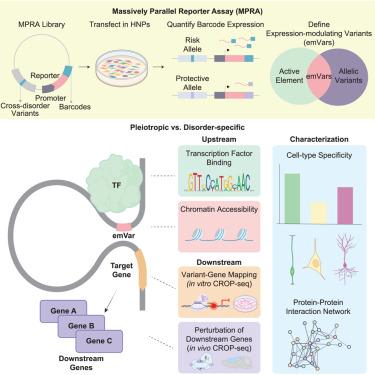Massively parallel reporter assay investigates shared genetic variants of eight psychiatric disorders
IF 45.5
1区 生物学
Q1 BIOCHEMISTRY & MOLECULAR BIOLOGY
引用次数: 0
Abstract
A meta-genome-wide association study across eight psychiatric disorders has highlighted the genetic architecture of pleiotropy in major psychiatric disorders. However, mechanisms underlying pleiotropic effects of the associated variants remain to be explored. We conducted a massively parallel reporter assay to decode the regulatory logic of variants with pleiotropic and disorder-specific effects. Pleiotropic variants differ from disorder-specific variants by exhibiting chromatin accessibility that extends across diverse cell types in the neuronal lineage and by altering motifs for transcription factors with higher connectivity in protein-protein interaction networks. We mapped pleiotropic and disorder-specific variants to putative target genes using functional genomics approaches and CRISPR perturbation. In vivo CRISPR perturbation of a pleiotropic and a disorder-specific gene suggests that pleiotropy may involve the regulation of genes expressed broadly across neuronal cell types and with higher network connectivity.

大规模平行报告者试验调查了8种精神疾病的共同遗传变异
一项跨八种精神疾病的全基因组关联研究强调了主要精神疾病中多效性的遗传结构。然而,相关变异的多效效应机制仍有待探索。我们进行了一项大规模平行报告分析,以解码具有多效性和疾病特异性效应的变异的调控逻辑。多效性变异体与疾病特异性变异体的不同之处在于,其表现出的染色质可达性可扩展到神经谱系中的不同细胞类型,并通过改变蛋白-蛋白相互作用网络中具有更高连通性的转录因子的基序。我们使用功能基因组学方法和CRISPR扰动将多效性和疾病特异性变异映射到假定的靶基因。体内对多效性和疾病特异性基因的CRISPR扰动表明,多效性可能涉及对跨神经细胞类型广泛表达的基因的调控,并且具有更高的网络连通性。
本文章由计算机程序翻译,如有差异,请以英文原文为准。
求助全文
约1分钟内获得全文
求助全文
来源期刊

Cell
生物-生化与分子生物学
CiteScore
110.00
自引率
0.80%
发文量
396
审稿时长
2 months
期刊介绍:
Cells is an international, peer-reviewed, open access journal that focuses on cell biology, molecular biology, and biophysics. It is affiliated with several societies, including the Spanish Society for Biochemistry and Molecular Biology (SEBBM), Nordic Autophagy Society (NAS), Spanish Society of Hematology and Hemotherapy (SEHH), and Society for Regenerative Medicine (Russian Federation) (RPO).
The journal publishes research findings of significant importance in various areas of experimental biology, such as cell biology, molecular biology, neuroscience, immunology, virology, microbiology, cancer, human genetics, systems biology, signaling, and disease mechanisms and therapeutics. The primary criterion for considering papers is whether the results contribute to significant conceptual advances or raise thought-provoking questions and hypotheses related to interesting and important biological inquiries.
In addition to primary research articles presented in four formats, Cells also features review and opinion articles in its "leading edge" section, discussing recent research advancements and topics of interest to its wide readership.
 求助内容:
求助内容: 应助结果提醒方式:
应助结果提醒方式:


